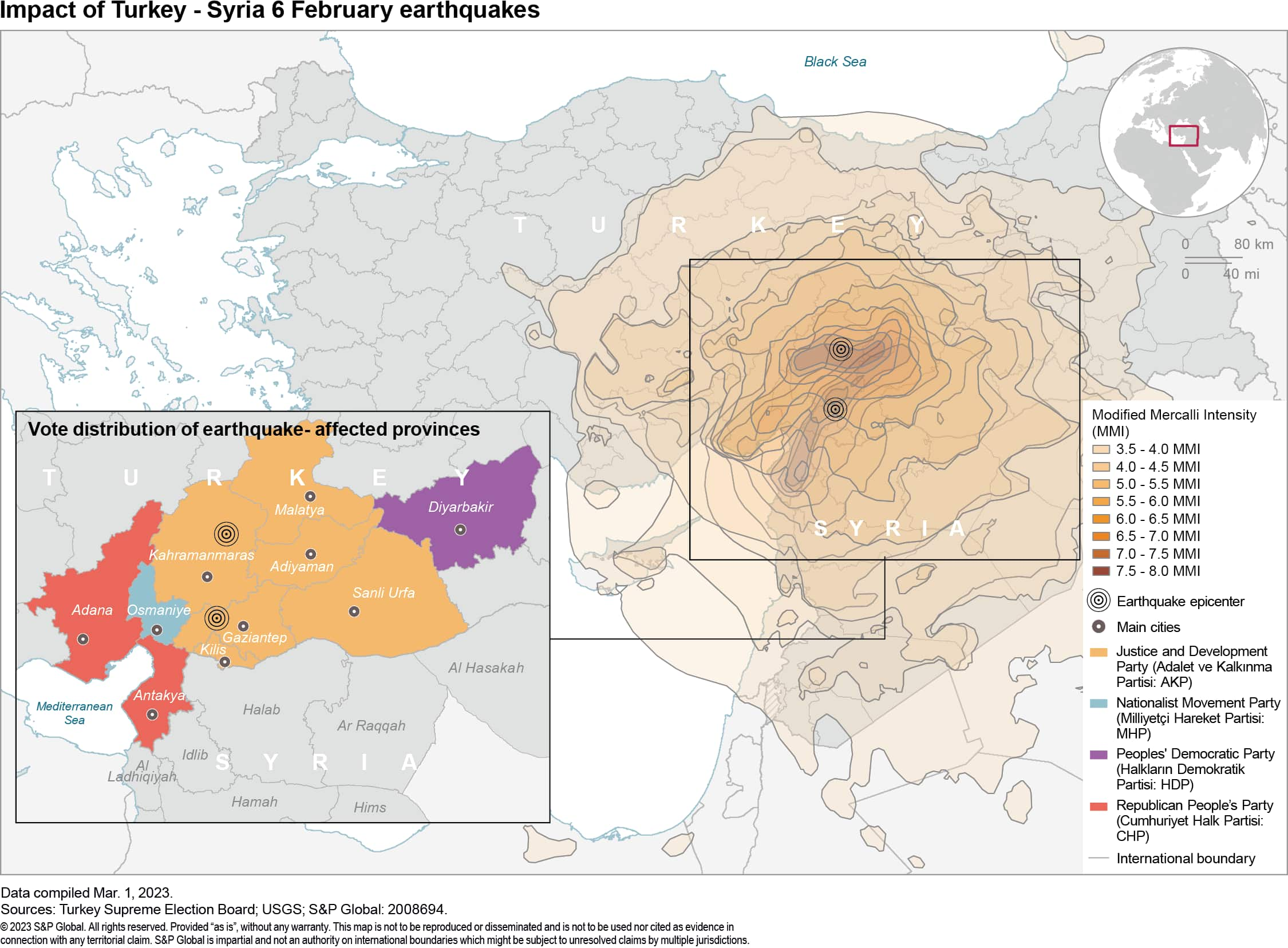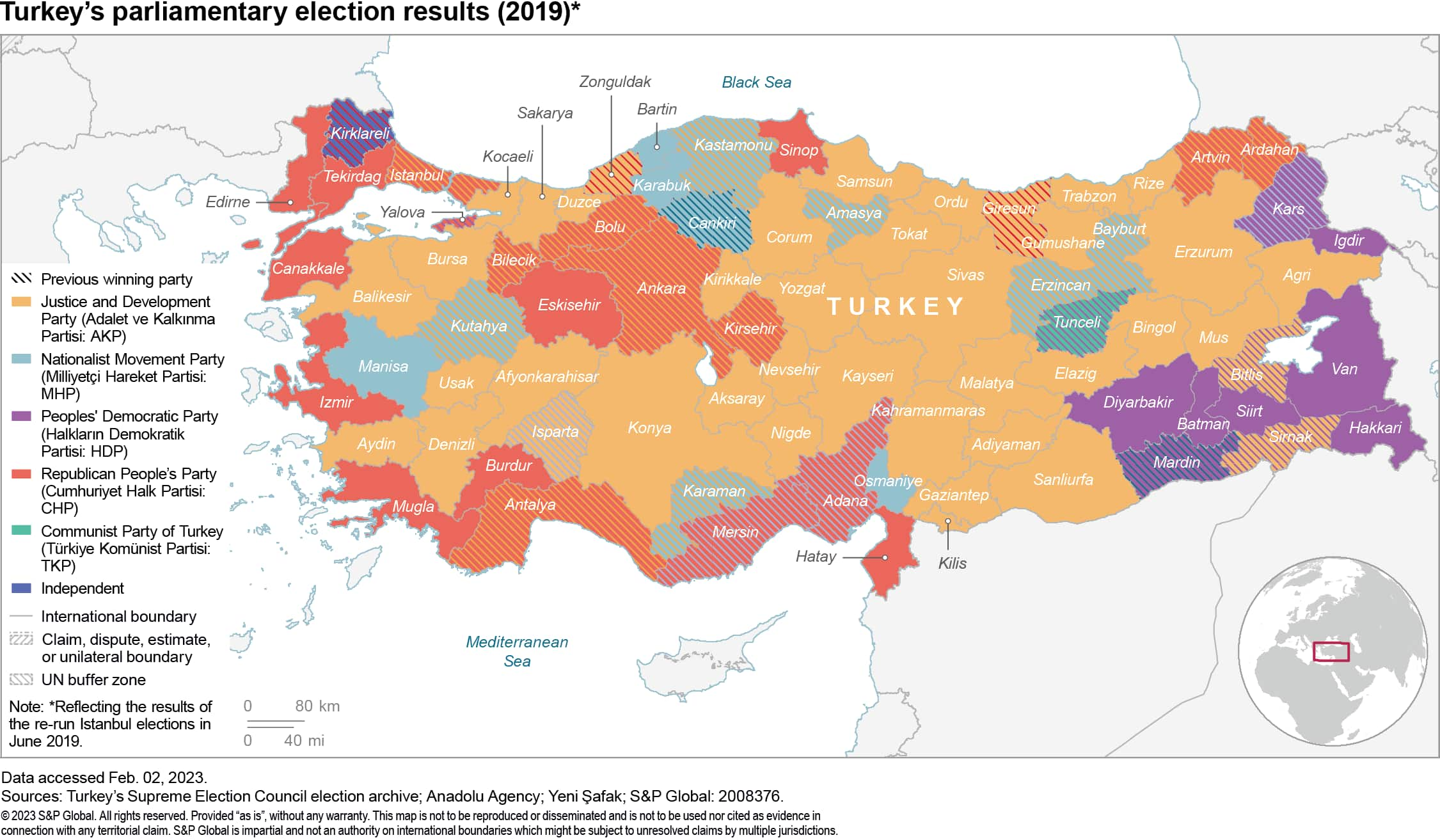Customer Logins
Obtain the data you need to make the most informed decisions by accessing our extensive portfolio of information, analytics, and expertise. Sign in to the product or service center of your choice.
Customer Logins
BLOG
Apr 20, 2023
Political scenarios for Turkey’s presidential and general elections
Turkey's joint presidential and general elections are scheduled for May 14, brought forwards from June to avoid the Hajj pilgrimage and university exam season to enable an increased voter turnout. A second-round vote for the presidency will occur on May 28, if no candidate achieves over 50% of the vote.
The results will determine whether the government continues with a presidential system under incumbent President Recep Tayyip Erdoğan and his Justice and Development Party (Adalet ve Kalkınma Partisi: AKP)-led "People's Alliance" or elects Republican People's Party (Cumhuriyet Halk Partisi: CHP) opposition presidential candidate Kemal Kılıçdaroğlu and the ideologically diverse, six party CHP-led "Nation Alliance."
Kılıçdaroğlu, a 74-year-old economist who has spent 13 years as leader of the CHP, has stated that he intends to revert Turkey's political structure to the pre-2018 parliamentary system, ending Erdogan's nine-year presidency and the AKP's 20-year domination of Turkish politics.
We examine potential electoral scenarios and their policy implications over a 12-month outlook from the election date, based on the premise that the elections are publicly viewed as legitimate and transfer of power is smooth.

An Erdogan re-election with an AKP-controlled parliament would mean broad policy continuity. Our scenarios therefore focus on the most likely alternative outcomes, particularly policy change and directions that would alter the investment and operational environment outlook for Turkey.
Scenario 1: CHP-led coalition with President Kemal Kılıçdaroğlu + vice president (High impact)
In this outcome, there is policy alignment in the one-year outlook between the parties in the ruling coalition, but significant hindrances due to a bureaucracy and legislature heavily dominated by, and loyal to, the AKP. Kılıçdaroğlu needs a super majority to make constitutional changes; he needs a simple majority to pass new legislation or reverse existing legislation, which he achieves.
- Domestic policy: The predominance of AKP influence over government ministries and bureaucracies poses further delays to the new government's legislative agenda, meaning that even legislation passed by the government faces delays in being enacted over the six-month outlook.
- Economic policy: The Nation Alliance would probably immediately replace the governor of the Central Bank of the Republic of Turkey (Türkiye Cumhuriyet Merkez Bankası: TCMB) with an individual who supports monetary policy orthodoxy, regulatory changes, and decoupling of the central bank from the president's office. The government focuses on earthquake reconstruction and social spending to support the populace during monetary policy tightening.
- Foreign policy: The Nation Alliance restarts discussions with the European Union on the Eurozone accession process. Kılıçdaroğlu's EU strategy necessitates expediting dialogue with Greece, including on Cyprus and on eventual progress towards joint gas exploration in the East Mediterranean. Increasing dialogue also reduces the risk of accidental kinetic escalation in the Aegean and naval provocation in the eastern Mediterranean. Decoupling with Russia means eventually reducing dependency on Russian gas. The new government seeks agreements with the United States on Turkey's purchase on F-35s, upgrade kits for the F-16s, and approvals regarding Turkey's use of Russia's S-400 surface-to-air missile system before committing to Sweden's NATO accession.
Scenario 2: AKP-led majority in the GNA; a Kılıçdaroğlu presidential candidate win (Moderate impact)
In this case, S&P Global Market Intelligence would expect significant policy uncertainty, with hindrances from both the executive and the parliament as each attempt to block the other's policy agenda.
- Domestic policy: Kılıçdaroğlu faces a government, bureaucracy, and legislature heavily dominated by the AKP after 20 years in power. Attempts to reduce AKP dominance in state institutions are hindered by the AKP majority, led by former president Erdoğan, in the GNA. Policy misalignment and legal cases targeting the executive increase leverage from parliament to force Kılıçdaroğlu to step down, given that he cannot enact any of his policy preferences through a simple majority or reduce the power of the executive through a supermajority vote. Kılıçdaroğlu can use his executive power to override some policy decisions, but effective implementation of his policy direction is unlikely. In the worst-case outcome for Kılıçdaroğlu, the AKP supports protracted mass protests against him, laying the basis for his resignation or removal, reinstating Erdoğan as executive.
- Economic policy: Kılıçdaroğlu refuses to use executive powers to replace the central bank governor, meaning that the executive and government are misaligned on economic policy until natural terms of policy-council members are concluded.
- Foreign policy: Votes on foreign policy decisions increasingly result in delays in and divisions between the main opposition Nation Alliance coalition, the AKP, and Kılıçdaroğlu. This decreases policy predictability and slows the speed of foreign policy decision making, including delaying the approval of the NATO accession process for Finland and Sweden. Mediation between Russia and Ukraine remains high on the foreign policy agenda, although Turkey's mediatory position is undermined by Kılıçdaroğlu's increasingly pro-European stance. Russian President Vladimir Putin begins dialogue with Kılıçdaroğlu to ensure that Turkey's position vis-a-vis the Russia-Ukraine war does not change. If engagement does not work and Turkish policy shifts significantly towards the European stance on Russia, Putin would likely demand to negotiate with Erdoğan, overriding Kılıçdaroğlu's authority. Unless Erdoğan steps in, nodes of communication via Turkey begin to deteriorate, resulting in the risk of a collapse of communication such as occurred with the Black Sea Grain Corridor agreement. Turkish military presence in Iraq, Syria, and Libya remains broadly stable.

Scenario 3: Erdoğan wins re-election; CHP-led coalition wins a parliamentary majority (High impact)
We would expect significant policy uncertainty in this case, with hindrances from both the executive and the parliament as each attempts to block the other's policy agenda. President Erdoğan can dissolve parliament and call new elections.
- Domestic policy: If new elections are not called, Erdoğan proposes policy choices that would test the unity of the diverse policy ideology of the CHP-led coalition, with the intended result of causing members of the ruling coalition to defect. Main societal policies that would cause this fracture are around women's rights and protections, increased limitations or freedoms on LGBTQIA+ rights including same-sex marriage, as well as Kurdish political freedoms. Such policy issues result in the İyi or DEVA party voting with the AKP, against the political ideology of the CHP's secular center-left political stance, eroding Nation Alliance cohesion which increases the risk of coalition collapse and early elections in the one-year outlook.
- Economic policy: Erdoğan overrides decision making, preventing the replacement of the central bank governor. The new government would therefore be unable to invite the International Monetary Fund (IMF) back to the country; without policy independence and realignment with monetary policy orthodoxy, the IMF would not re-engage. The combination of a TCMB board that is antagonistic to the government and supportive of the executive means that the new government and the Erdoğan-aligned central bank no longer operate in parallel, significantly raising policy uncertainty. If the new government can enact significant monetary tightening in the first three months after government formation, the risk of a hard landing to current expansionary economic policies would significantly rise.
- Foreign policy: Erdoğan continues to pursue his own foreign policy initiatives with or without the ruling coalition's backing That includes diplomatic engagement with Arab leaders, and mediation between Russia and Ukraine with the aim to increase investment, while consolidating funding and support for his continued tenure. Foreign policy decisions, including the CHP-led government's likely intent to withdraw troop deployments in northern Syria and Iraq, are overruled by the executive. The main opposition AKP party aligns with Erdoğan 's policy direction; Erdoğan maintains cordial relations with Russian President Vladimir Putin, preventing policy disengagement from Russia.
This article was published by S&P Global Market Intelligence and not by S&P Global Ratings, which is a separately managed division of S&P Global.
{"items" : [
{"name":"share","enabled":true,"desc":"<strong>Share</strong>","mobdesc":"Share","options":[ {"name":"facebook","url":"https://www.facebook.com/sharer.php?u=http%3a%2f%2fstage.www.spglobal.com%2fmarketintelligence%2fen%2fmi%2fresearch-analysis%2fpolitical-scenarios-for-turkeys-presidential-and-general-elect.html","enabled":true},{"name":"twitter","url":"https://twitter.com/intent/tweet?url=http%3a%2f%2fstage.www.spglobal.com%2fmarketintelligence%2fen%2fmi%2fresearch-analysis%2fpolitical-scenarios-for-turkeys-presidential-and-general-elect.html&text=Political+scenarios+for+Turkey%e2%80%99s+presidential+and+general+elections+%7c+S%26P+Global+","enabled":true},{"name":"linkedin","url":"https://www.linkedin.com/sharing/share-offsite/?url=http%3a%2f%2fstage.www.spglobal.com%2fmarketintelligence%2fen%2fmi%2fresearch-analysis%2fpolitical-scenarios-for-turkeys-presidential-and-general-elect.html","enabled":true},{"name":"email","url":"?subject=Political scenarios for Turkey’s presidential and general elections | S&P Global &body=http%3a%2f%2fstage.www.spglobal.com%2fmarketintelligence%2fen%2fmi%2fresearch-analysis%2fpolitical-scenarios-for-turkeys-presidential-and-general-elect.html","enabled":true},{"name":"whatsapp","url":"https://api.whatsapp.com/send?text=Political+scenarios+for+Turkey%e2%80%99s+presidential+and+general+elections+%7c+S%26P+Global+ http%3a%2f%2fstage.www.spglobal.com%2fmarketintelligence%2fen%2fmi%2fresearch-analysis%2fpolitical-scenarios-for-turkeys-presidential-and-general-elect.html","enabled":true}]}, {"name":"rtt","enabled":true,"mobdesc":"Top"}
]}






